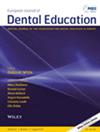Factors Influencing the Quality of Undergraduate Students' Degree Projects: From Student and Supervisor Perspectives
Abstract
Background
Degree projects are part of most professional study programmes and correspond to professional and academic requirements. Therefore, this study aimed to investigate factors that influence the quality of student degree projects from a supervisor and student perspective.
Methods
Semi-structured interviews were performed with eight supervisors from the study programme in dentistry at Karolinska Institutet. The interviews were transcribed. The first part was summarised and described, and the second part was analysed thematically. Also, a questionnaire was completed by 45 students in their 7th and 9th semesters of the study programme. Student responses were summarised and described.
Results
The main findings indicate a convergence of expectations and perspectives between supervisors and students regarding the factors that influence the quality of the degree project. They emphasise the importance of realistic expectations, feasibility and adherence to academic standards for a high-quality outcome. Effective supervision involves the supervisor being readily available, responsive to student inquiries and supportive in time–management. Conversely, students are expected to demonstrate motivation, engagement and increasing autonomy. Additionally, both agree that the project should be engaging, relevant to the supervisor's expertise and the student's interests, contribute to personal and academic growth and ideally result in a publication.
Conclusions
Taken together, supervisors and students share grounds for the degree project work, which is an important condition for ensuring a qualitatively sound degree project. Sharing expectations and perspectives in the beginning and having a continuously open dialogue concerning this issue during the degree project work benefits a sustainable collaboration and ensures quality.

 求助内容:
求助内容: 应助结果提醒方式:
应助结果提醒方式:


